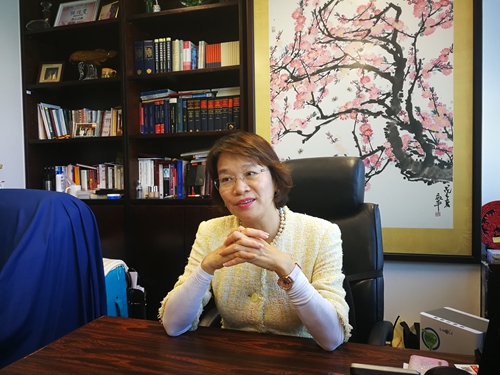HOME >> CHINA
HK legislator backs NPC on mask ban ruling
By Wang Wenwen, Yang Sheng and Bai Yunyi in Hong Kong Source:Global Times Published: 2019/11/21 23:03:40

Priscilla Leung Mei-fun, Hong Kong barrister and legislator. Photo: Bai Yunyi/GT
The Standing Committee of the National People's Congress (NPC) has the final say on Hong Kong laws and the recent remarks of this legislative body of China on the mask ban ruling are a reiteration of this long-held fact, said a Hong Kong legislative councillor.
On Monday, Hong Kong's High Court ruled that the anti-mask law enacted under emergency legislation was "incompatible" with the region's Basic Law.
Local media reported Thursday that the court has postponed its decision on whether to retain or suspend the ruling following a request from the Department of Justice to keep the law enacted before a final verdict is reached.
The mask ban, which took effect on October 5, was enforced by Hong Kong Chief Executive Carrie Lam to help quell the months-long radical protests. "The turmoil in Hong Kong right now is not only a matter of Hong Kong's autonomy but will surely mean the central government will have to react. The chief executive has to report to the central government about what measures she is taking to stop the violence and end the chaos," said barrister and legislator Priscilla Leung Mei-fun in an exclusive interview with the Global Times.
The High Court ruling has raised criticisms, as many blamed it for ignorance of the current tense situation in Hong Kong.
The Legislative Affairs Commission of the Standing Committee of the NPC has expressed deep concern over the ruling, saying that only the Standing Committee of the NPC can judge and decide whether Hong Kong laws are in line with the Basic Law.
"The remarks by the NPC Standing Committee are not new but only a reiteration of the fact that the NPC has the final say regarding the Basic Law," Leung said.
Leung noted that Article 158 of the Basic Law stipulated that the power to interpret the Basic Law shall be vested in the Standing Committee of the NPC, which is also stated in the provisions of Article 67 (4) of the Constitution of China.
Where relations between the central government and Hong Kong are concerned, the Court of Final Appeal, before making the ruling, can ask the Standing Committee of the NPC for an interpretation, she added.
Since Hong Kong returned to China in 1997, this has occurred twice when the NPC Standing Committee took the initiative to interpret the Basic Law.
Article 158 of the Basic Law also stipulates that Hong Kong courts can interpret the Basic Law within the limits of the autonomy of Hong Kong.
Leung noted that in the past 22 years, in most cases the NPC did allow Hong Kong courts to make their own interpretations, but if it touched on Central government-Hong Kong relations, the central government has the right to express its view.
She said that the High Court's ruling on the anti-mask law did touch on the issue of relations between the executive and legislative branch, and at a timing not under normal circumstances, but under a situation of turmoil that may affect national security.
"Not every controversy necessarily led to an interpretation from the Standing Committee of the NPC, and the central government has adopted restraint in its approach to decide whether a particular issue has a profound influence on Hong Kong and on the country," Leung said.
In October, Chief Executive Carrie Lam, with her executive power granted by both the Hong Kong Special Administrative Region (HKSAR) government and the central government, invoked the Emergency Regulations Ordinance (ERO) to enact the mask ban.
"So the question goes to whether the chief executive has the power to invoke the ERO when she thinks the situation is an emergency," Leung said, adding that the HKSAR government should make an appeal to seek the court's explanation on relations between executive and legislative branch.
After the remarks made by the Standing Committee of the NPC, some legal experts in Hong Kong expressed concern that Hong Kong courts may be deprived of the right to rule on the "constitutionality" of local laws, which shows that they are unwilling to view the Basic Law within the national legal framework, Leung said.
Posted in: HK/MACAO/TAIWAN